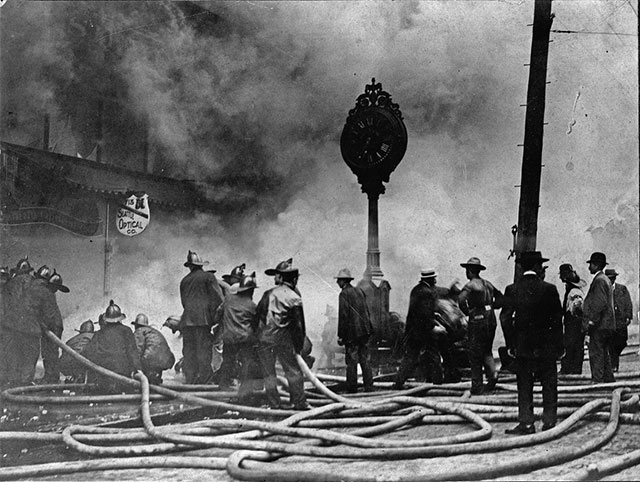
Truthout is an indispensable resource for activists, movement leaders and workers everywhere. Please make this work possible with a quick donation.
Wednesday night was the third Republican presidential primary debate, and the 10 candidates spent the majority of the time demonizing the federal government and social services.
Medicare is near the top of services that the Republican candidates want to cut or privatize, with candidates like Ted Cruz also taking aim at doing away with Obamacare completely.
The conservative ideology is clear, their logic is simply that anything that can be done for the public good must also represent an opportunity for capitalists to make a buck.
See more news and opinion from Thom Hartmann at Truthout here.
But strangely enough, those very same conservatives drive on public roads, and would call the public fire department if their house ever caught fire.
Not all of those services have always been publicly provided though, in fact, fire departments were privately run in the US up until around the time of the Civil War.
Before that time, private citizens paid fire companies for fire insurance, and then hung a medallion for that fire company on the front of their building.
If and when a fire broke out, the different fire brigades would all race to put the fire out, if the building had the medallion of a fire insurance company.
And if it didn’t, then the blaze would simply be allowed to burn until it threatened a building that did have a medallion on display.
But around the time of the Civil War, big cities like New York started abolishing their for-profit fire departments and created their own city and state run fire departments.
Which just makes sense, because a fire doesn’t just threaten the individual property owner.
Just look at the Great Chicago Fire in 1871 for a prime example of how a fire on a single property can threaten an entire city.
The whole point of government is to provide necessary public services that promote the “general welfare,” as they refer to it repeatedly in the Constitution.
So if we care so much about our buildings, why don’t we protect our bodies the same way?
When a person is sick, their body is literally inflamed as a result of their body’s immune response.
And depending on why their sick, that inflammation can spread quickly across a community.
Take the example of Typhoid Mary, who infected 51 people, three of whom died, over the course of her career as a cook.
The outbreak was so bad and so persistent that she was forcibly quarantined several times in the early 20th century.
That was while the study of how diseases spread was still nascent, but it served as an early US example of why health care is fundamentally a public concern.
And then there was the Ebola outbreak last year in Texas.
Texas refused Medicaid expansion under Obamacare and it also doesn’t guarantee paid sick leave for workers.
And the early signs for Ebola are similar to that of a common cold, sneezing, coughing and a scratchy throat.
Those factors made the potential threat of Ebola spreading in Texas much, much greater than in a state where low-income workers can get free health care and can take off work when they’re sick without losing pay.
What low-wage worker in the fast food industry is going to forfeit an entire day’s wages because of the sniffles?
And what person wants to spend an entire day in an emergency room because they might have the sniffles, or they might have Ebola?
No one.
But those actions would be in the best interest of the society as a whole.
Because on the off chance that the worker doesn’t just have the sniffles, and does actually have Ebola, everyone in that community would want the worker to take time off work and seek medical attention.
As Paul Krugman points out, health insurance shouldn’t be bought and sold in private exchanges like bread or TVs.
It should be treated like the fire department as part of a collective responsibility and a collective good.
It’s not something anybody wants to have to use, but it should be available to everyone just in case.
Because it’s in the public interest that fires are put out, and that sick people get treatment.
It’s time to shut down all this Republican talk about how to restrict access to Medicare or how Medicare can be transformed into a profit center for some billionaire.
Instead, we should extend Medicare coverage to everyone, and start treating health care as a right and a public good, and not as a privilege for those few who can afford it.
A terrifying moment. We appeal for your support.
In the last weeks, we have witnessed an authoritarian assault on communities in Minnesota and across the nation.
The need for truthful, grassroots reporting is urgent at this cataclysmic historical moment. Yet, Trump-aligned billionaires and other allies have taken over many legacy media outlets — the culmination of a decades-long campaign to place control of the narrative into the hands of the political right.
We refuse to let Trump’s blatant propaganda machine go unchecked. Untethered to corporate ownership or advertisers, Truthout remains fearless in our reporting and our determination to use journalism as a tool for justice.
But we need your help just to fund our basic expenses. Over 80 percent of Truthout’s funding comes from small individual donations from our community of readers, and over a third of our total budget is supported by recurring monthly donors.
Truthout’s fundraiser ended last night, and we fell just short of our goal. But your support still matters immensely. Whether you can make a small monthly donation or a larger one-time gift, Truthout only works with your help.